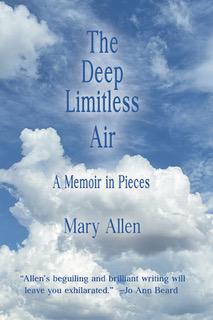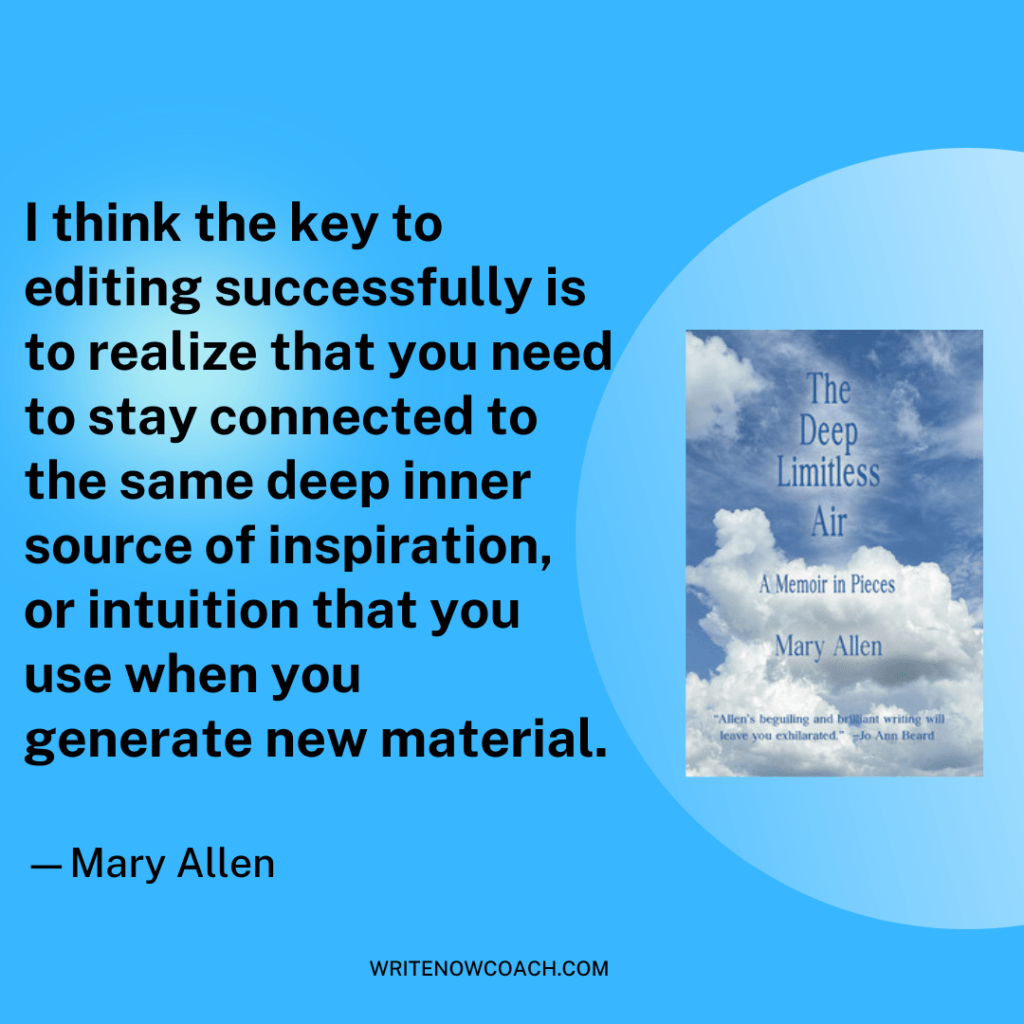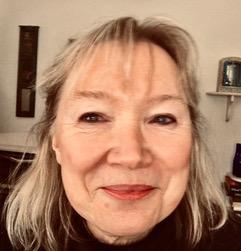Writers@Work: Writing a Memoir in Essays
June 28, 2022
Note From Rochelle
Dear Writers,
Today I’m delighted to welcome Mary Allen to the blog to talk about her new book The Deep Limitless Air: A Memoir in Pieces. And if you live in the Milwaukee area, I’ll be interviewing her live at Boswell Book company next Thursday, July 7 at 6:30 PM. Please register and stop by to meet us at Boswell. (And although I have links to the book at Bookshop, if you’re coming in person–please buy your book from Boswell.)
Happy writing,
Rochelle, the Write Now! Coach
Writers@Work: Writing a Memoir in Essays
An Interview with Mary Allen
Can you tell us about your new book, The Deep Limitless Air: A Memoir in Pieces?
 The Deep Limitless Air is a collection of linking personal essays. Each essay is a tiny memoir that poses and answers a small or large narrative question—for example, how did I manage to fly to New York and give a public speech when I had a phobia of flying and a phobia of public speaking, and how did that lead me to decide to become a writer? There are pieces about my relationship with a famous elderly writer; about my sister’s life and death and my connection with her and her daughter; about rescuing baby rabbits, capturing mice in a plastic salad spinner, and being held hostage in a Franciscan hermitage by a praying mantis; about insomnia, a bird trapped in a monastery, a metaphorical biohazard on a train, a shooting in a physics department, the surprising fallout of a broken shoulder, and much more.
The Deep Limitless Air is a collection of linking personal essays. Each essay is a tiny memoir that poses and answers a small or large narrative question—for example, how did I manage to fly to New York and give a public speech when I had a phobia of flying and a phobia of public speaking, and how did that lead me to decide to become a writer? There are pieces about my relationship with a famous elderly writer; about my sister’s life and death and my connection with her and her daughter; about rescuing baby rabbits, capturing mice in a plastic salad spinner, and being held hostage in a Franciscan hermitage by a praying mantis; about insomnia, a bird trapped in a monastery, a metaphorical biohazard on a train, a shooting in a physics department, the surprising fallout of a broken shoulder, and much more.
You describe your book as a “memoir in pieces.” Can you talk about what you mean by that—and how you went about writing the book?
Collected together, the individual pieces echo and revisit each other, revealing an evolving arc and telling a larger, overarching story. I wrote these pieces over many years, and it was only when I put them together that I saw how they connected and created a whole story. I struggled for a long time with how to put them together, then on a vacation in March 2020 (at the very beginning of the pandemic!) it came to me that I could take a chapter out of my unpublished memoir about my childhood and make that the first essay in the collection, Bees. I tried that and it made the whole thing come together. The process was intuitive throughout and sort of magical—to me there’s always an element of magic when the writing is really working, because you’re connecting with some larger smarter part of yourself usually called the unconscious. And it was magical that I wrote these pieces over many years and they all ended up fitting together. For example, a conflict that gets introduced in an essay called Blue Blotter, which I probably drafted in the early 1990s, got resolved in a piece I wrote—and based on an experience I had—in about 2017. Because I’m a memoir writer and I write about what happens to me, my life as it unfolds leads the way. I just write down what happens, and when I do I realize that life itself is full of metaphors and meaning and a lot more magical than we usually think it is. And a lot more interesting than anything I can come up with in my head.
You also work as a teacher and writing coach. What are some tips that you give to writers working on a memoir?
If you haven’t started, the first step is probably identifying the story you want to tell. It doesn’t work to just tell everything that happened to you in chronological order, as in an autobiography; you need to find a story that unfolded in your life which has a beginning, middle, and end, something that will make it interesting enough for people to want to read. I taught a class a few times called Finding the Story in Your Story, where I had people think of unusual things they’d done in their lives (think Wild by Cheryl Strayed, a very successful memoir about hiking the Pacific Crest trail), as well as unique relationships and dramatic events in their lives. Once you know more or less what you want to write your memoir about, I suggest making a list of key moments that stick in your mind or pop into your mind when you get quiet—not just things that happened over time, but particular moments, even if you don’t know the whole story behind them. Once you’ve got some moments, you can start writing about them. The way I do that is to enter the moment like a portal, on the page, and write about it in the present tense, putting down whatever details come to me, letting the writing show me where to go and what’s significant. As you write more moments will come to you and so will what you need to fill in for background, like connecting tissue, to create the story. Eventually that moment-writing will give you the framework for the whole memoir, like a dot-to-dot picture, or perhaps even become the memoir.
I know you gave a talk on staying confident during editing. As an experienced writer, I still struggle with confidence. Any tips on how we can remain calm and confident?
I think the key to editing successfully is to realize that you need to stay connected to the same deep inner source of inspiration, or intuition, or whatever you want to call it, that you use when you generate new material.

Writing is a very spiritual process; it simply is if you want to do it successfully; you can’t do narrative writing—anything where you’re telling a story—from the analyzing, information-departing part of your brain that you use to write, say, a textbook about biology. Most people know they have to stay open to the unconscious to some degree when they’re generating new material, but it’s easy to lose sight of that when you’re editing, and then, in my experience, your thinking, doubting, analyzing brain gets over involved. Plus you’re thinking about what’s wrong with what you wrote so the self-critical part of you tends to take over and as soon as that happens you lose track of what’s good and what needs to be changed and start hacking the whole thing up. I think of editing—every time I change some piece of language, either in my writing or one of my client’s—as a kind of small meditation. I use my intuition to identify what’s not working by paying close attention to how I feel as I read something, and when I feel confused or bored or my attention wanders, that’s usually a clue that something needs to be changed (because after all we’re trying to create writing that will hold the reader’s attention.). I focus on the spot where I encountered the problem, quiet my thoughts for a brief moment (think spiritual meditation, where the goal is to stop mind-chattering for however long you can). Quieting my mind while I’m editing allows me to connect with the deeper smarter unconscious part of myself whether I’m aware that I’m doing that or not. Then when I turn my attention back to the problem bit of writing, after a few seconds, I almost always have a word or phrase or whatever that works better, pop into my mind. Once I’ve made the change, I read it over, doing my little editing meditation again (I call this putting it in the hopper), and when I do that, I know for sure whether my editing suggestion works. This process keeps me feeling confident, and if I ever lose my confidence I know that I have to slow down and go back to my little editing meditation mode. I learned how to do this unconsciously over many years of writing, and it was only when I was a writing coach and was trying to help other writers edit successfully, that I noticed what I was doing.

What are you reading now?
I’m currently reading The Latecomer by Jean Hannff Korelitz and the new mystery by Dervla McTiernan, The Murder Rule. I have a weakness for well written mysteries and thrillers, usually by women. I feel like I’m learning how to create fictional plots, never my strong point, although I can somehow create dramatic tension in a memoir, from reading them.
 About the author. Mary Allen is the author of The Rooms of Heaven, published by Alfred A. Knopf and Vintage Books. She received a National Endowment for the Arts grant in 2002. Her work has appeared in Poets & Writers, Tiferet, Real Simple, Library Journal, CNN On-line, Little Village, The Chaos, Shenandoah, Spoon River Poetry Review, and in the anthology If I Don’t Make It, I Love You: Survivors in the Aftermath of School Shootings. She has an MFA from the Iowa Writers’ Workshop and has taught at the University of Iowa. She lives in Iowa City and is a full-time writing coach.
About the author. Mary Allen is the author of The Rooms of Heaven, published by Alfred A. Knopf and Vintage Books. She received a National Endowment for the Arts grant in 2002. Her work has appeared in Poets & Writers, Tiferet, Real Simple, Library Journal, CNN On-line, Little Village, The Chaos, Shenandoah, Spoon River Poetry Review, and in the anthology If I Don’t Make It, I Love You: Survivors in the Aftermath of School Shootings. She has an MFA from the Iowa Writers’ Workshop and has taught at the University of Iowa. She lives in Iowa City and is a full-time writing coach.









